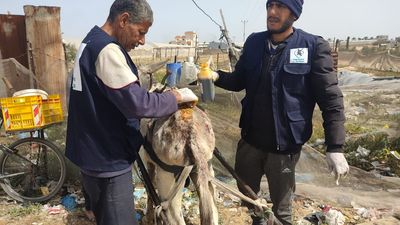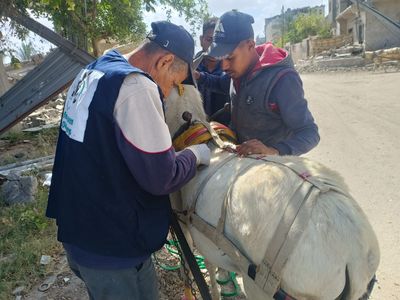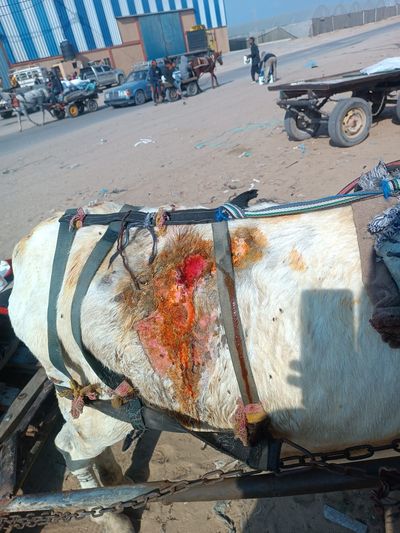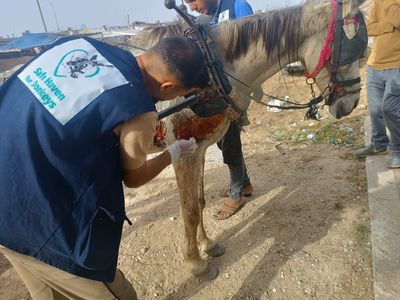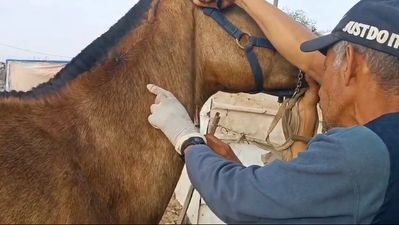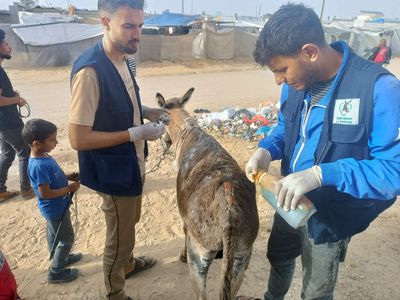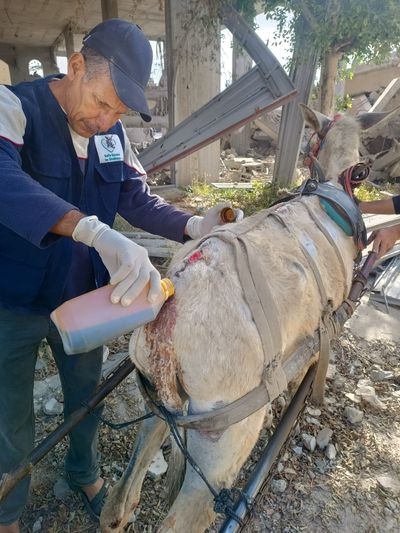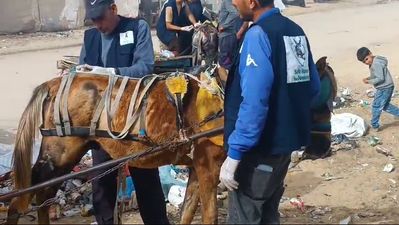UK charity provides urgent veterinary support to working animals in Gaza
Published:
Read Time: 4 mins
A British charity is providing emergency care to working donkeys and horses, which are proving critical to the civilians in Gaza who are living through an ongoing catastrophe that has brought death and destruction on an unimaginable scale. Thousands have died, many more have been injured, and huge swathes of people are fleeing for their lives. Now more than ever they are relying on their working animals to help them survive.
Safe Haven for Donkeys, a British registered charity that cares for working and abandoned donkeys in Israel, the Palestinian Territories, and Egypt, is funding a mobile first-aid team to treat animals needing veterinary intervention, focussing largely on the donkeys and horses that are becoming crucial to those living in Gaza.
An important role for the animals
With fuel scarce, and many trucks, vans and cars destroyed, donkeys and horses have become the main mode of transport – moving people, often those that are injured, to hospital, alongside carrying food, water, and essential medicines through a war-ravaged landscape.
Understandably, given the situation on the ground, with the desperate needs of the people and the lack of alternative transport, these animals are working in appalling conditions – suffering malnourishment, dehydration and excruciating wounds from the heavy loads they carry and pull.
Led by Dr Saif, Safe Haven for Donkeys’ team in Gaza is working tirelessly every day to provide relief to donkeys and horses that have horrific harness wounds, as well as injuries from missiles and bombs. Having treated approximately 800 donkeys and horses since the team started their work in April, this number is only growing.
Today the people of Gaza ask more of their donkeys than ever before
Andy Foxcroft, CEO of Safe Haven for Donkeys explains: “Trucks, vans and cars, even ambulances are rare, fuel is rarer still. So, the iconic image of a car with its engine removed being towed by an underweight donkey, is now a reality. They are now the main mode of transport; not just for humans themselves, but for everything they need.”
In a heartfelt recollection, Dr Saif details how the “vast majority of my people now depend on donkeys. A friend of mine had a wife who was due to give birth. There was no way for an ambulance or car to take her from home to the hospital, due to the danger involved in the area so we had to use a donkey. She had twins in the hospital, and it was a donkey that saved her and her babies’ lives.”
Despite the evident reliance on donkeys in all aspects of life, it is still the case that donkeys continue to work under horrific conditions in Gaza. Due to food shortages, fatigue and beating, as well as a considerable number suffering from injuries sustained from explosions of missiles and bombs, the team's work has never been more needed. Dr Saif shared how “Shrapnel has killed some and hurt many. This is why they are so vulnerable.”
The mobile clinic team continues to battle to reach every working donkey in need before it is too late and for some, the medical intervention came just in time. Dr Saif adds, “There's certainly very good improvement to the majority of cases we've treated. It's important to mention that we have done all this even though we don't have enough equipment and medicine.”
Time is of the essence
The situation for the team on the ground is fraught. Due to the last aid shipment from Safe Haven currently being held at the border, the team are forced to function on minimal supplies and work as best they can in a difficult situation. “To access medications we often have to travel far, even up to 20 kilometres, to get them” explained Dr Saif.
Andy Foxcroft, CEO of Safe Haven for Donkeys, says, “Our shipment of food and medicines are desperately needed in Gaza. The donkeys will only be able to support their owners and the community if they are fed and cared for.”
For more information on Safe Haven for Donkeys and to support the donkeys in Gaza visit https://www.safehaven4donkeys.org/gaza-2024/
Ends
Editors notes
Safe Haven for Donkeys is a British registered charity that provides vital veterinary care, food and sanctuary to donkeys in Israel, the West Bank, Egypt and Gaza. They reach donkeys in dire need in one of the hardest to reach regions of the world.
The charity, which was set up in 2000, runs a donkey sanctuary near the Israeli town of Netanya, a donkey hospital in the Palestinian city of Nablus, a donkey rescue centre in Arrana and three mobile veterinary teams in Hebron, Jenin and the Jordan Valley, treating up to 200 working donkeys, mules and horses every week.
In 2023, after being approached by a veterinary surgeon in Egypt, they began working with an Egyptian partner organisation to ease the pain and suffering of the donkeys in the brick kilns in the El Saf region. And more recently they have introduced a first aid mobile clinic in Gaza, providing much-needed help to working donkeys, mules and horses in the region.
Visit www.safehaven4donkeys.org for more information.

